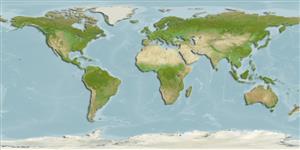Teleostei (teleosts) >
Perciformes/Bembropoidei (Duckbill flatheads) >
Bembropidae (Duckbill flatheads)
Etymology: Bembrops: Greek, bembras, -ados = a kind of anchovy m+ Greek, ops = appearance (Ref. 45335); morelandi: Named for J.M. Moreland of the National Museum of New Zealand.
Eponymy: John ‘Jock’ Munne Moreland (1921–2012) was Curator of Fishes, Dominion Museum (now Te Papa), Wellington. [...] (Ref. 128868), visit book page.
Environment: milieu / climate zone / depth range / distribution range
Ecology
Marine; bathydemersal; depth range 366 - 395 m (Ref. 13203). Deep-water
Southwest Pacific: known only from New Zealand.
Size / Weight / Age
Maturity: Lm ? range ? - ? cm
Max length : 20.7 cm SL male/unsexed; (Ref. 13203)
Dorsal spines (total): 6; Dorsal soft rays (total): 13 - 14; Anal soft rays: 16 - 17. Color in alcohol yellowish gray dorsally, slightly lighter ventrally. Snout relatively long, 1.8x eye diameter. Scales present on lateral and dorsal sides of snout. Upper jaw extending behind anterior margin of eye, almost to the mid-line. Maxillary tentacle long. Lateral line rising sharply above pectoral fin at base for 2-2.5 scale rows and then descending gradually along length of pectoral fin, separated from origin of first dorsal fin by 2 rows of scales, from origin of anal fin by 5, and from insertion of anal fin by 3. First spine of the first dorsal fin prolonged, even in a relatively small specimen. Predorsal length (to first dorsal fin) almost equal to head length. Pectoral fin rounded (Ref 13203).
Holotype taken in 366-395 m.
Life cycle and mating behavior
Maturity | Reproduction | Spawning | Eggs | Fecundity | Larvae
Das, M.K. and J.S. Nelson, 1996. Revision of the percophid genus Bembrops (Actinopterygii: Perciformes). Bull. Mar. Sci. 59(1):9-44. (Ref. 13203)
IUCN Red List Status (Ref. 130435: Version 2024-1)
Threat to humans
Harmless
Human uses
Tools
Special reports
Download XML
Internet sources
Estimates based on models
Preferred temperature (Ref.
123201): 8.9 - 11.3, mean 10.8 °C (based on 6 cells).
Phylogenetic diversity index (Ref.
82804): PD
50 = 0.5000 [Uniqueness, from 0.5 = low to 2.0 = high].
Bayesian length-weight: a=0.00380 (0.00157 - 0.00921), b=3.11 (2.91 - 3.31), in cm total length, based on LWR estimates for this (Sub)family-body shape (Ref.
93245).
Trophic level (Ref.
69278): 4.1 ±0.5 se; based on size and trophs of closest relatives
Fishing Vulnerability (Ref.
59153): Low vulnerability (15 of 100).
